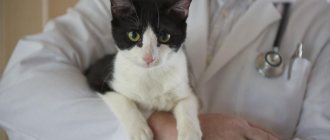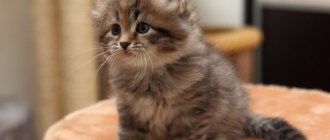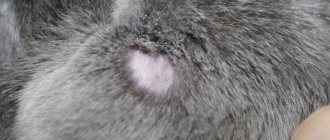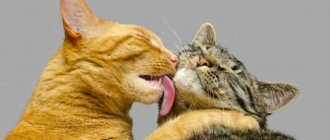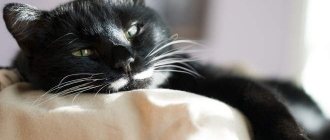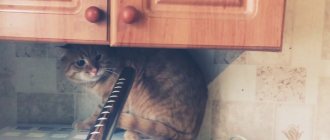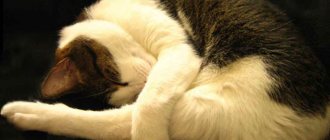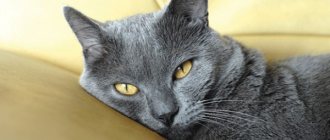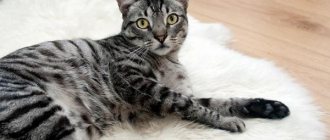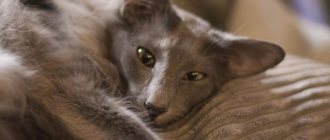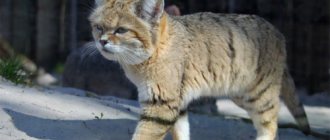Why do I lose my appetite?
Lack of appetite is not always a deviation and requires the intervention of the owner. Cats can set a “fasting period” for themselves once every 2-3 months. At the same time, water consumption does not stop.
Reference! The norm for fasting while maintaining good health and activity for an adult is considered to be 2-5 days, for a kitten - 1 day.
A pet’s refusal to eat may be a consequence of external factors, body characteristics or diseases. In any case, it would be a good idea to consult a veterinarian.
Forum KOTODOM
A change of place of residence, or the departure of beloved owners on vacation, can deprive the cat of the desire to eat. In this case, appetite is also restored without the intervention of a veterinarian. But if depression lasts longer, or additional signs of ill health appear, you should definitely take your cat to the doctor.
An animal may refuse to eat during periods of illness with viral and bacterial infections accompanied by a runny nose. At the same time, she partially loses her sense of smell, and food does not seem attractive to her.
In the postoperative period, when treated with certain medications, during chemotherapy, the animal’s appetite decreases. In this case, he will recover on his own with proper care of the cat.
If poisoned by stale food or poisons, the cat refuses to eat, drinks a lot, may have increased salivation, blood in the stool, weakness, vomiting, diarrhea and other signs of intoxication.
Refusal to eat is possible in case of internal injuries and fractures, which are accompanied by internal bleeding, pain, nausea and sometimes vomiting. The animal is lethargic, makes plaintive sounds, and hides.
Almost all infectious diseases accompanied by fever lead to decreased appetite. At the same time, the cat sleeps a lot, moves little, and develops symptoms specific to a particular disease.
Traumatic brain injuries, strokes and other brain damage can cause animals to lose their sense of smell. In this case, the cat also loses interest in food.
Diseases of internal organs, primarily the digestive system, during an exacerbation period can cause a decrease in the animal’s desire to eat. This may be intestinal obstruction, a foreign body in the digestive system, inflammatory diseases of the gastrointestinal mucosa, pancreatitis and other pathologies.
Natural reasons for refusing to eat
Cats are very sensitive animals, often reacting with a lack of appetite to factors that are not significant in the opinion of their owners:
- dirty dishes. Cats are extremely clean, so unwashed bowls with leftover food and the smell of sour food can cause reluctance to eat. Poorly washed plates pose a potential threat for the development of various intestinal diseases. Dishes washed with a product with a strong, persistent odor can ruin the appetite of any animal;
- high air temperature. When hot weather sets in, all animals experience a decrease in appetite. A cat can lie on the floor all day without showing interest in food. In such a situation, there is no need to try to feed your pet. During hot weather, cats should always have access to fresh water. Dehydration of more than 15% can cause irreversible changes in the functioning of the animal's body;
Heat can cause your cat to lose appetite
Domestic cats are very finicky creatures, but the creators of dry food managed to please them. Most purrs, having tried dry granules, refuse to return to natural food. This is very convenient for owners. Find out how to properly feed your cat dry food in our separate article.
- change of feeding place. When moving a bowl of food to the wrong place, the cat may completely or partially refuse food. In this case, it would be better to return the plate to its original place or find another animal that suits it;
- stressful situations. Undeserved punishment, a change in the situation in the house, moving, or the appearance of a new pet can cause stress in a cat. The consequence may be complete refusal of food. In such a situation, the animal needs to be petted more often and treated with treats. If the animal does not calm down for more than 2 days, you should contact a veterinarian and resort to treatment with sedatives;
- aging. As a cat ages, it becomes less active and less likely to show interest in food. In this case, it is recommended to give your pet more treats, change the diet, monitoring appetite and the amount of food eaten;
How to calm a March cat
Why does your pet try to eat litter?
If there is a lack of calcium and minerals in the body, cats may begin to eat granules that are poured into the tray. This can cause intestinal problems. The silica gel composition is especially dangerous, as it sticks to the pet’s internal organs and in some cases leads to the pet’s death.
The best way out of the situation is to purchase calcium-containing vitamins, add bone meal and nutritional supplements rich in minerals to food. If the problem does not go away, you urgently need to change the brand of filler and monitor the result.
Reference! Sometimes cats scratch their teeth with litter granules, swallowing the splattered pieces. The problem is solved by including pork and beef bones in the pet’s diet.
Why is there a problem?
Physiological reasons
Often a cat’s poor appetite is associated with dirty dishes or the selection of a low-quality bowl for eating food. There are other natural factors that lead to a cat’s reluctance to consume food:
- Increased air temperature. Loss of appetite often occurs in the summer during hot weather. In this case, it is important to provide your pet with constant access to clean, drinking water.
- Sudden changes in the cat's diet.
- Change of feeding place. If the owners constantly rearrange the cat's bowl, then the cat may lose its appetite completely or partially. To fix the problem, simply return the cat's plate to its place.
- Impact of stress.
- Aging of the body. With age-related changes, the pet becomes lethargic, moves less and there is a decrease in appetite.
- Hair accumulation. Cats are clean animals and love to lick themselves constantly, which is why a lot of hair collects in the stomach. In this case, the cat’s lack of appetite can also cause vomiting and problems with stool.
Veterinarians note that during puberty, an animal may lose its appetite for several days, and sometimes even a week. At the same time, owners should not worry, since the disorder will go away on its own after estrus.
Pathological factors
If the cat has lost its appetite and has lost a lot of weight, this may indicate the development of the disease. The following pathologies are identified that influence the reluctance to eat food:
- infection with small parasites;
- diabetes;
- heart diseases;
- kidney failure;
- intestinal obstruction;
- inflamed upper respiratory tract and paranasal sinuses;
- anemia;
- diseases associated with tooth decay;
- inflammation of the pancreas;
- leukemia;
- inflammatory reaction in the intestines;
- pills and other drugs that negatively affect the cat’s appetite.
Return to contents
What to do if your cat stops eating?
The instructions below apply only to those cases when the animal does not exhibit symptoms of acute diseases, pain, vomiting, breathing problems, pallor, or discharge from the mouth. So, your cat is visually healthy, but for more than a day, she leaves the bowl barely sniffing the food - we act:
- , norm 37.5–39°. Considering that the indicator is individual, measurements are taken every hour. A drop in temperature indicates a loss of strength.
- We constantly monitor the condition of the mucous membranes; normally they are moist, shiny, the nose is cold, the eyes are “alive”, the gums and tongue are pink.
- We track the accommodation of the pupils. Turn off the light and after 3-5 seconds, shine a flashlight into the cat’s eye; the pupils should narrow at the same speed and turn into narrow slits. Violation of accommodation indicates a malfunction of the nervous system, loss of strength or toxicity.
- All procedures are carried out in a quiet, darkened room. Bedding, bowls, litter tray and personal belongings of the pet are transferred to the “ward”. It is advisable to increase the humidity in the hospital room, especially during the heating season - use a humidifier, wet towels hung on the radiators.
Important! Noticed additional symptoms besides food refusal? Is your cat starving for more than a day? Are you seeing the first signs of dehydration? - To the vet!
Cat owners know that proper and wholesome nutrition is the key to the health, beautiful appearance, activity and good mood of their pet. Therefore, at the first signs of a deterioration in the pet’s appetite, the owners begin to sound the alarm and resort to tricks to force him to eat. But before you panic and take any measures, you need to find out why your cat has a poor appetite.
Why does my cat have a bad appetite?
What can't you do?
If a cat does not want to eat, it is not recommended to disturb him, especially touching his tail. At the same time, it is important to pay attention to the pet so that it knows that the owners are nearby and care about it. It is not recommended to allow loud noises and scandals, which can cause additional stress for the pet. Owners should not leave the cat's food and drink bowl in the air, so it should be washed daily with special products. If you do not want to eat, it is prohibited to carry out independent treatment and prescribe various medications without the knowledge of the veterinarian.
Lack of appetite due to illness
Refusal of treats associated with the loss of olfactory or tactile functions of the body, developing against the background of a progressive disease, is called anorexia. In addition to this, the pet also exhibits other symptoms characteristic of a particular disease.
Exhaustion in anorexia
Table 1. Diseases, their symptoms, treatment methods.
Why doesn't the cat eat
Sometimes animals lose their appetite due to stress. Moving, traveling, guests in the house and the arrival of new family members can make a cat very nervous. Young cats may become reluctant to eat during their first heat.
To understand the cause of loss of appetite, pay attention to the accompanying symptoms. Be wary if the cat is weak and behaving unusually.
Diseases
A cat is not harmful if, in addition to refusing to eat, it vomits or produces a lot of saliva - the animal is really unwell. Often the cat does not eat or drink water - it becomes so difficult for him.
In this case, you should immediately go to the veterinary clinic: there the cat will be examined and the necessary tests will be done. A veterinarian can diagnose the following diseases:
- Digestive problems: allergies, poisoning;
- Diseases of the digestive system;
- Parasites. The appetite will return after the worms are removed;
- Diseases of the reproductive system;
- Problems with mucous membranes: throat, nose or tongue;
- Blood diseases.
Once the disease is identified, the doctor will prescribe treatment, which must be strictly followed. When the cat recovers, he will eat again.
Nervous system disorders
This is another common reason why a cat has no appetite. Cats and cats are quite sensitive animals. They react to almost any significant change in lifestyle, and sometimes the pet’s reaction can be unpredictable. Obviously, some situations are likely to cause stress, which explains why I lost my appetite:
- Moving to a new place. For example, a kitten that has been separated from a cat and settled in a new home is at risk.
- Long, hours-long journey.
- The arrival of a new pet.
- Birth of a child.
- Dangerous situations (for example, a fight with a cat, the threat of a dog attack, etc.).
- Insufficient attention from the owner, conflict atmosphere.
- Long-term absence of the owner (it is known that cats very often become attached to a specific person and do not like change).
In rare cases, cats lose their appetite even due to harmless reasons - changing the bowl, changing the location of the toilet or rest area. Therefore, it is worth analyzing whether there were any significant changes the day before. If the reason for loss of appetite is related to stress, it is necessary to give your pet as much attention as possible.
Tip 4: Catnip and cats
A long time ago it was noticed that cats love valerian and catnip, which act on them like a drug. Cats may behave differently after smelling catnip, but the behavior will most likely be strange. How does catnip affect cats?
The Nepeta cataria plant, popularly called catnip, contains a substance called nepetalactone that attracts cats. Kittens no older than 2 months are, however, indifferent to this plant.
Cats, as usual, sniff the catnip leaves, lick or chew them, and then behave in an unusual way. Moreover, this behavior can be different: some cats rub their faces against the plant, others stand with their eyes fixed at one point and shake their heads, and others roll back and forth on the floor. This behavior continues for an average of 5-15 minutes. Repeated sniffing of catnip for an hour does not produce the same reaction.
Provoking a good appetite
Pet stores today sell quite a lot of cat vitamins, which include seaweed and catnip, yeast and other beneficial substances. They are designed specifically for pets. These are appetite stimulants for cats that improve metabolism.
Many cats love to eat sprouted grass. It also improves the animal's appetite and strengthens the immune system. You can buy sprouted grass at a pet store or grow it yourself. It's no secret that the key to a good appetite is a healthy stomach. Therefore, you need to monitor your pet’s nutrition from a very early age and try to keep it in the best possible condition.
If poor appetite is associated with stress, then catnip will be a good help. What is it for? It has a positive effect on the body, calms and helps relieve stress. Moreover, the grass is completely harmless to digestion. Many medications to increase appetite in cats contain extracts of this plant, due to which they give excellent results. The plant has only one drawback: it cannot be used often, because otherwise it becomes addictive.
We return the cat's appetite
Pay attention to how much your cat doesn't eat. If there is no appetite for less than a day, there is no need to sound the alarm: perhaps by the evening the pet will come to its senses. However, be careful with small kittens: such a period of fasting is deadly for them.
Check to see if your cat has a fever: loss of appetite often accompanies it. If the cat is not sick, but just being mischievous, try these techniques:
- Check to see if the cat's food has spoiled and if it smells good. Animals smell better;
- Wash bowls thoroughly to remove foreign odors;
- Change the contents of the bowl - the food may have become stagnant;
- Check to see if your cat has been eating in secret. Perhaps he was fed by other family members;
- Offer your cat a treat. Maybe the bad guy just wants something tasty.
When there is no reason to worry
In some cases, the cat does not eat anything for completely understandable, objective reasons, for example:
- change of season - if a cat is allowed outside, in the spring it may eat less, as the body adjusts to the summer season: besides, the animal often finds other food on the street;
- poor appetite is observed during the breeding season, which also occurs in spring: the cat may become more aggressive, overexcited and lose significant weight;
- strong changes in weather, pressure changes can also cause a loss of appetite: especially if the cat is already quite old;
- finally, if the owner washed the bowl with a chemical and inadvertently did not completely wash off the residue, this also explains why the cat lacks appetite.
Thus, you should only worry in cases where other symptoms are added to the loss of appetite - for example, nausea, vomiting, lethargy for a long period of time. It is possible that the cat has developed a stomach or intestinal disorder, so an urgent consultation with a veterinarian will be needed.
Lack of appetite in a cat is always associated with the presence of some disease. Ignoring this phenomenon can lead to progression of the disease for your pet.
READ Calcivirosis in cats and kittens
Disease
If your cat has lost its appetite, the reason may lie in some disease. Problems with eating food may arise due to the following pathologies:
- diabetes;
- pancreatitis;
- infectious diseases;
- helminthic infestations;
- leukemia;
- problems with teeth or oral cavity (stomatitis, gingivitis, etc.);
- renal failure;
- food poisoning;
- intestinal diseases.
If your pet is sick, he will usually have other symptoms:
- vomit;
- nausea;
- lethargy and low activity;
- change in color of mucous membranes;
- rapid breathing, etc.
If your cat has no appetite, is lethargic, or you notice any changes in behavior, contact your veterinarian immediately. He will order an examination, and after establishing a diagnosis, he will prescribe treatment and select the right diet. Do not self-medicate, since it is impossible to determine pathology by lack of appetite. A timely visit to the doctor can be a salvation for the animal. If you have not noticed any significant changes, but your cat categorically refuses to eat, as a result of which she has begun to lose a lot of weight, do not delay going to the veterinary clinic.
Important! In some cases, refusal to eat is caused by prolonged use of medications, as the animal becomes intoxicated. In this case, you need to remove toxins from the body and adjust the basic treatment.
Intestinal obstruction
The cause of the pathology is most often the penetration of foreign objects into the gastrointestinal tract. These can be small toys, threads, pins, Christmas tree rain and other objects that the cat plays with. Intestinal obstruction can also be caused by hair. This pathology poses a danger to the pet's life. If the intestine is completely blocked, surgery may be required. Other symptoms usually indicate a problem:
- bloating;
- lethargy and inactivity;
- lack of stool;
- abdominal pain;
- increasing vomiting.
Some owners give the animal Vaseline oil so that the stuck object comes out on its own, but this is strictly prohibited. When moving, it injures the intestines. An examination and consultation with a doctor is required.
Diseases
If the appetite has disappeared and the cat is lethargic, these may be symptoms of any diseases:
- infections;
- inflammatory processes;
- development of benign or malignant tumors;
- dysfunction of the liver, intestines or stomach;
- oral diseases.
Such pathologies lead to anorexia (complete lack of appetite), which can lead to depletion of the body. Therefore, if your appetite has disappeared for no apparent reason. You should immediately contact a veterinary clinic for examination.
How does chronic renal failure develop in cats?
Chronic renal failure is a constantly progressive irreversible disease.
Its cunning lies in its long, completely asymptomatic course.
It slowly and mercilessly destroys the kidneys until less than 45% of the kidney tissue remains.
Chronic renal failure has three stages:
- Initial – there is a decrease in appetite, dry skin, and periodic vomiting. The creatinine level at the initial stage does not exceed 250 µmol/l.
- Conservative - the animal is depressed, attacks of diarrhea and vomiting are possible, the eyes are sunken, the withers, when compressed, do not straighten out (the first sign that the animal’s body is severely dehydrated). Creatinine ranges from 260 to 440 µmol/l.
- Terminal – the level of creatinine in the blood exceeds 440 µmol/l. The cat may develop seizures, uremic encephalopathy, and interstitial pulmonary edema.
It is important to understand that CKD (chronic kidney disease) is an incurable disease. However, modern veterinary medicine is able to stabilize the animal’s condition and provide high-quality supportive therapy, which significantly increases the life of cats.
Diagnostic issues
The reactive development of acute renal failure often does not allow any symptoms of the disease to be discerned. Noticing deviations in the cat’s behavior, such as:
- apathy;
- refusal to eat;
- nausea;
- vomit;
- changes in mucous membranes;
- ammonia smell from mouth -
veterinarian consultation is required. To make an accurate diagnosis, laboratory tests, abdominal ultrasound and radiography will be needed.
Despite such serious changes occurring in the body, recognizing the disease can be problematic even for an experienced specialist, not to mention the average person. To make a diagnosis, it is necessary to collect as complete an anamnesis as possible. Next, his data is compared with the clinic and the results of biochemical studies of urine and blood.
During the survey they find out:
- Does the animal have kidney problems and what kind?
- was it possible that there was poisoning?
- When did the decrease in urination begin?
They also evaluate edema and its nature, listen to the heart to identify murmurs.
The laboratory must carry out:
- general urine analysis,
- analysis for protein, urea, chlorides and sugar in urine,
- investigate the composition of the sediment,
- blood is checked for acid-base balance.
Only based on the entire range of studies conducted can we draw a conclusion about existing kidney problems.
The onset of the disease is almost impossible to suspect, since there are no signs. The disease manifests itself when more than 50% of the kidney tissue is affected. As a rule, a reason to think that a cat’s condition indicates a diagnosis of renal failure is an analysis of its recent behavior - changed preferences, unhealthy appearance and poor activity.
1. The cat comes to the water bowl more often, drinks a lot and pees more.
2. Decreased appetite and weight loss of the cat.
3. The cat has become calmer and plays less.
4. Periodic vomiting and diarrhea (as a result of intoxication).
5. The coat loses its shine, becomes dull, dry, and does not even out after ruffling.
6. The smell from your mouth takes on an ammonia-like hue (not everyone can recognize this smell).
7. The mucous membrane of the mouth is paler than usual, ulcers may form.
8. The nose has become paler.
9. Prolonged constipation (a symptom of dehydration).
10. In severe stages - swelling of the abdomen and paws.
With acute renal failure and chronic renal failure, the entire body suffers, so the disease is classified as life-threatening and requires immediate treatment with medications.
When the kidneys are working well, toxins, waste and toxic substances are eliminated from the body, there are no surges in blood pressure, and normal production of enzymes and some hormones occurs. The kidneys are involved in the formation of blood cells.
If the kidneys fail, the pressure drops, the heart is overloaded, anemia develops, the body is cluttered with toxins, the cat becomes lethargic, inactive, and vomits. The digestive system suffers greatly, hormonal levels change. Kidney dysfunction leads to a complete malfunction of the entire body.
Diagnostics
AKI or chronic renal failure can only be diagnosed by a veterinarian by passing a urine and blood test. A clear sign of kidney failure is the level of creatinine, as well as high levels of protein in the urine and the presence of pus (if an infection develops).
Acute renal failure in cats treatment, diagnosis, causes
Natural causes
Sometimes even pets that have no health problems refuse to eat. Poor appetite in a cat can be caused by:
- Stress. When moving, visiting an exhibition, having guests or other stress, the animal refuses to eat. An attentive attitude towards the pet, affectionate communication, and feeding with treats usually helps to solve the problem.
- Dirty dishes. Cats are very clean, so they may refuse food due to a poorly washed bowl or the presence of a sour smell. Using a detergent with a strong scent will also repel the animal.
- Heat. In the summer heat, pets limit their food intake. There is no point in insisting otherwise, but ensuring constant access to clean water is extremely important.
- Approaching birth. A couple of weeks before the birth of the offspring, females reduce the amount of food they eat. Fasting should not be allowed. You should choose special food with vitamin complexes.
- Hormonal changes. At puberty, animals refuse food. This applies to both males and females. Such fasting usually does not harm the pet.
- Change of food. If you switch from dry food to natural food or you change from one manufacturer to another, your pet may show character and refuse to eat. To prevent this problem, new food should be introduced gradually.
- Change of feeding place. Pets get used to one place, and therefore moving the bowl often causes protest. If your cat has a poor appetite due to a change in feeding location, and you don’t know what to do, try returning the bowl to its original location.
Older pets have a reduced need for food due to less activity. A weak appetite in this case is normal and therefore does not require human intervention.
Drawing attention to food
This is a fairly simple method that allows you to solve the problem and increase your appetite. You can attract your cat's attention with your favorite treats. This risks the animal being spoiled, but everything is good in moderation. You can offer food as food with a strong, characteristic odor that stimulates appetite.
Tuna or sardines are suitable for this purpose. Research shows that these are the types of fish that elicit the greatest response from cats. A few drops of catnip extract will further enhance this effect. An increase in the content of B vitamins in food has a similar effect. And best of all, create conditions that will awaken hunting instincts. Hang pieces of food on a string so that your pet has to work hard to get them.
Esophagostomy
An esophagostomy should be considered whenever the patient either has anorexia or is unable to eat for any reason (eg, severe maxillofacial trauma, neoplasm). Esophagostomy tubes are easy to place, require minimal equipment, and can be used immediately. Esophagostomy is contraindicated in patients who are unable to protect their airway, those with vomiting or regurgitation, or those with functional or mechanical esophageal abnormalities such as megaesophagus or stricture (3). Placing an esophagostomy requires anesthesia, but usually not as deep as that used for surgical interventions. The patient must be sufficiently anesthetized to place the speculum in the mouth without being able to bite.
Depending on the method used and the size of the patient, an 8–20 Fr catheter is selected. The large diameter of these catheters makes it possible to opt for crushed recovery diets, sometimes even without dilution with water. They are also convenient for owners to provide nutritional support to their pets, as long as vomiting does not occur. For cats with chronic kidney disease, an esophagostomy tube can provide another method of fluid delivery and even replace the uncomfortable, stressful procedure of infusing fluid into the subcutaneous space. Once the stitches are removed, the tube can simply be pulled out. It is recommended to treat the exit hole as a wound that heals by secondary intention. You can also apply a simple bandage in the first 12 hours after the stitches are removed. Complications associated with esophagostomy tube placement include dislodgement of the tube due to vomiting or removal by the patient, cellulitis around the introitus, and biting off the end of the tube by the patient after vomiting (1).
Gastrostomy
Gastrostomy tubes are used for long-term nutritional support in seriously ill animals. Gastrostomy tubes can fairly easily provide formula to chronically ill or anorexic patients over many weeks or months (6). The gastrostomy tube delivers nutrition distal to the esophagus, making enteral nutrition possible in patients with esophageal diseases. Gastrostomy is well tolerated, allows bolus feeding, and is intended for long-term feeding at home (2). The gastrostomy allows the patient to eat normally and helps transition the animal to normal feeding before its removal. Gastrostomy placement can be performed surgically or percutaneously. Percutaneous gastrostomy can be placed with or without an endoscope (5). Major complications associated with gastrostomy include injury to the visceral peritoneum during percutaneous placement and peritonitis due to gastric contents entering the peritoneal cavity due to dislodgement or exposure of the tube. As with any surgically placed feeding device, cellulitis and infection at the insertion site are possible (2).
How to help a cat?
Treatment of serious illnesses is best left to specialists. In order to assess the cat's health, he needs to be taken to a veterinarian. If there are no serious pathologies, then you need to follow a few simple rules:
- the animal does not need to be overfed;
- It is better to feed him hourly (3-4 times a day), without exceeding feeding standards;
- choose quality food.
“We are responsible for those we have tamed,” that is, by taking a cat into the house, a person is responsible for it. The animal needs to not only be fed and its tray with feces washed. It needs affection, care, to be played with if it is a young cat, or simply caressed if the age of the pet makes it calmer.
A pet’s reluctance to eat can be associated with pathological and physiological factors. Appetite stimulants for cats are selected by a veterinarian depending on the reasons that provoked the problem. A kitten's lack of desire to eat food may be due to an inappropriate bowl or the pet does not like the food itself. Also, the cause of poor appetite often lies in the influence of stress. Such factors can be easily eliminated and the pet will start eating again. But if the disorder is due to illness, then the cat will additionally experience vomiting, lethargy, fever, and other unpleasant symptoms that cannot be eliminated without the help of a specialist.
What measures can be taken?
Poor appetite, even in a healthy cat, is a cause for concern. When you refuse to eat, the animal’s body stops receiving the necessary vitamins and minerals. This may affect the activities of individual organs and systems.
Some cats can go without food for 1 to 5 days. They arrange a fasting day for themselves. If during this period the pet remains cheerful and active, and this happens once every few months, there is no need to worry. But kittens, pregnant and lactating females need to be provided with adequate nutrition.
If you don't know what to do if your cat has poor appetite, pay attention to the following tips:
- Try changing your diet. Animals may become bored with the food if you use it for a long period.
- Use cat grass. You can buy it in the store or germinate it yourself at home. The herb stimulates the intestines and thereby increases appetite.
- Give your animal vitamins. Pharmacies and pet stores sell special vitamin complexes, but you should consult your veterinarian before purchasing them. Fish oil may be a good alternative. It can be given to both adult pets and kittens.
Advice! During the molting period, be sure to give your cat a special paste that helps remove the fur out. This will prevent its accumulation in the intestines.
Eating problems
Sometimes owners do not pay much attention to what they feed their pet.
If the diet is too monotonous, the question may later arise of what to do if the cat loses its appetite. Obviously, the animal may get tired of the same food over time, so the cat will be extremely reluctant to eat it. Then it is enough to introduce new components - feed or familiar homemade food. Another problem is insufficiently high-quality products, for example, sausages, pates of dubious composition, cheap food from little-known manufacturers, etc. It is important to pay attention to the composition and, if necessary, consult a veterinarian. It is possible that even some normal foods are contraindicated for your cat due to the characteristics of the digestive system.
Digestion stimulation
When the digestive system is functioning well, increased appetite is often observed. You can improve digestion in simple and accessible ways:
- include low-fat fermented milk products in small quantities in your diet;
- use catnip, seaweed, brewer's yeast and other nutritional supplements;
- On an empty stomach, give the animal raw yolk.
If problems with eating food are caused by problems with the digestive system, you can replace regular food with medicinal food. In this case, you should consult your doctor. Medicinal food should be given for a short period of time.
For anorexia (severe weight loss), the animal is prescribed medications. Only a veterinarian should select them, since all medications have contraindications and side effects.
Ways to improve appetite
Changing your daily diet
To prevent your cat from losing the desire to eat, you must always feed him high-quality and healthy food. Since representatives of the cat family are carnivores, milk alone is not enough for its stomach to function normally. It is possible to increase your cat's appetite by giving him meat, poultry and other healthy foods. If your pet has sensitive digestion, it is recommended that you, together with a specialist, select a special food and feed it only. It is important to understand that it is not possible to improve the appetite of cats with the following dishes:
To stimulate the digestive tract, veterinarians recommend giving your cat a raw yolk once a week.
To improve appetite, it is recommended to feed your pet meat and fish, and grains and herbs in moderation are also beneficial for the cat’s body. It is possible to increase your cat's appetite if you give him a small amount of catnip. Such a stimulant can be addictive in a pet, so it is worth consuming a little of it, just a few leaves, after which the functioning of the digestive tract improves.
What vitamins will help?
Decreased or increased appetite in a cat can be observed both against the background of pathological and physiological factors. To normalize digestion, the animal needs to be given vitamins and special nutritional supplements. Special complexes are suitable for the cat's body, helping to awaken appetite, which contain seaweed, mint, yeast and other useful components. Thanks to such vitamins and supplements, the cat's metabolic processes improve.
The grown grass will have a positive effect on the general condition of the animal.
If the cat has lost his appetite, then to make it appear again, it is recommended to grow grass at home, which is a good stimulant. With its help, your pet not only returns the desire to eat, but also strengthens the immune system. You can purchase sprouted grass at a pet store or grow it yourself at home.
Medicines that help with the problem
Medicines help awaken an animal’s appetite, but it is important to understand that any tablet should not be given to a cat without a veterinarian’s prescription, since the risks of complications are high. This technique is used only in extreme cases when other methods do not give a positive result. Veterinarians recommend the following medications to increase appetite:
- "Periatin". The drug primarily stops the allergic reaction. You can purchase the drug at a veterinary pharmacy, and it is available in the form of tablets, gel or liquid. The latter products are applied to the fur near the tips of the cat's ears. This is a good stimulant aimed at increasing appetite.
- "Remeron". The drug is prescribed to people with depression, but it is also possible, as prescribed by a veterinarian, to be given to cats to increase the desire to eat. With its help, it is possible to reduce the manifestation of nausea.
- "Valium." If the cat has no appetite, then it is possible to use this medicine. The dosage is selected exclusively by a specialist and it is strictly forbidden to give the medicine at your own discretion.
Return to contents
